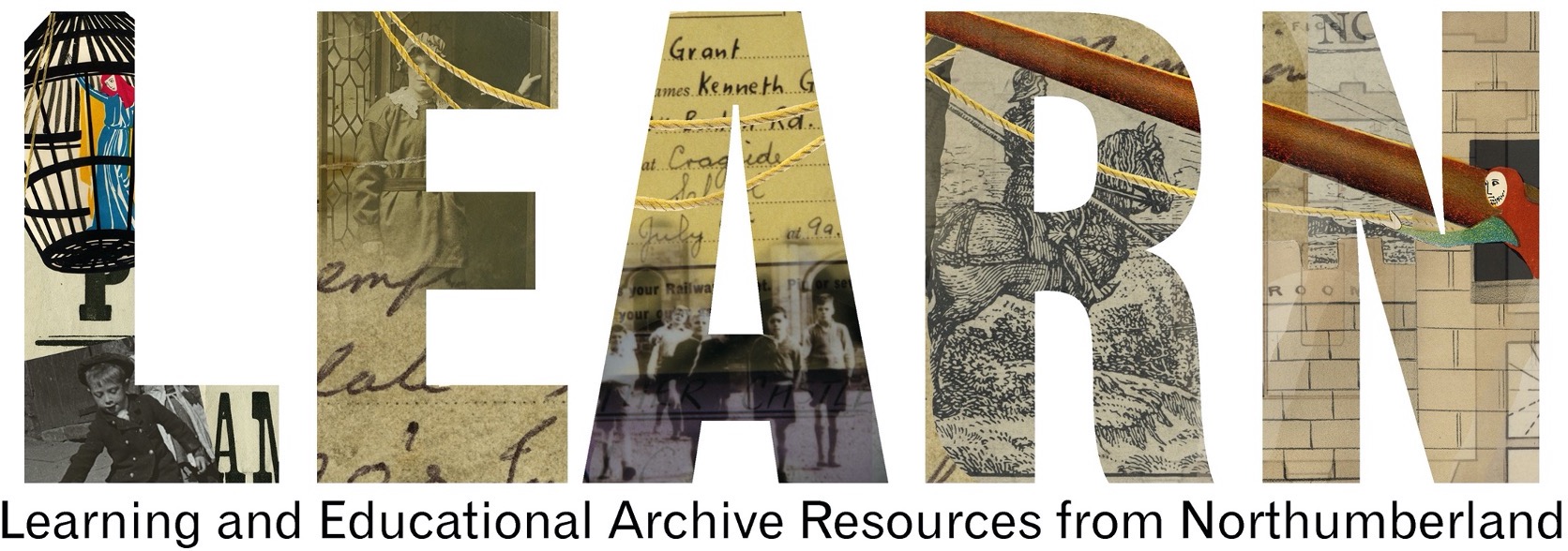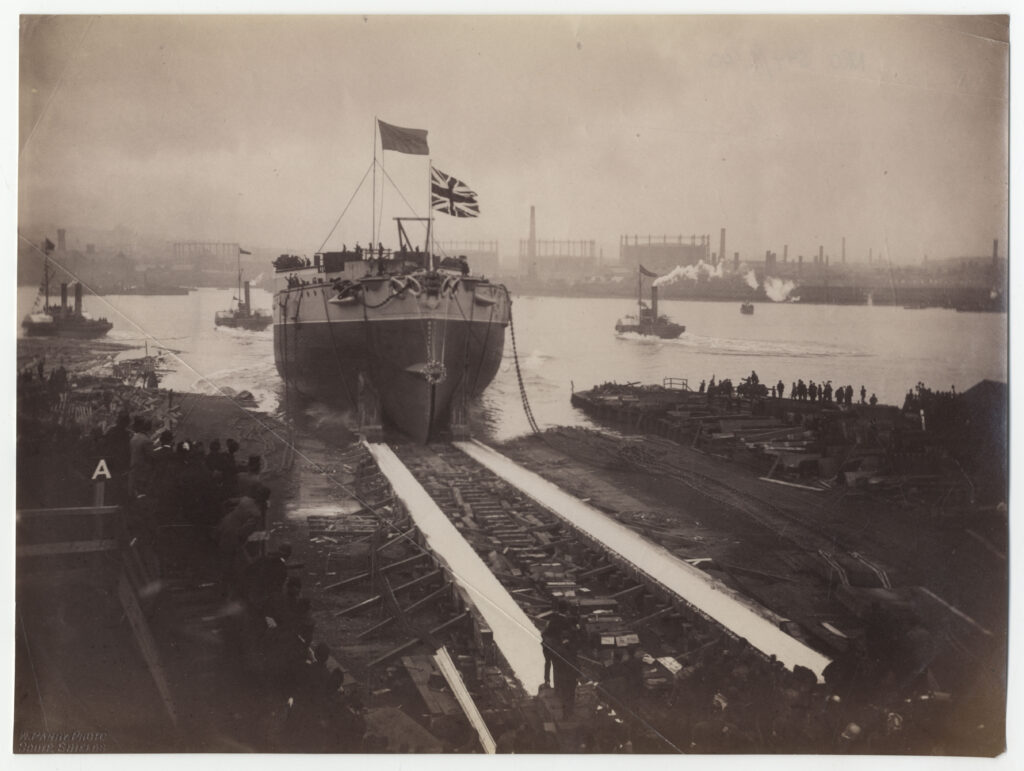Oral History of Doreen and Cynthia
Reference: T/442 Image: NRO 0594/02/40
Suggested age groups:KS1, KS2, KS3, KS4, lifelong learners
Subject areas:Industrial History, Shipping, Coal Mining, Transportation, Oral History
Download Word Document
Download PDF
Extract 1
Extract 2
CONTEXT
These sound files are extracts (short, edited pieces) from longer oral history interviews preserved by Northumberland Archives. These interviews were made as part of a project to collect the memories of people who lived and worked on the Northumberland coast; “Sustaining Our Coastal Heritage”, 2006-2008.
Doreen was born in the 1920s, Cynthia was born in the 1940s. They were interviewed 9 November 2006 by Sarah Belcher.
Q. And the harbour as well, do you remember how different that was when you were younger?
Oh yes yes, um walking from the ferry to come to where I was working, it was past the shipyard and it was very very high walls, as the ships were being built you could see them, towering, towering above. But the harbour was very very busy. Um the ships as we were saying were three deep. And then during the war it was a submarine base. And it was a very big submarine base, I don’t think people realised just how busy it was, and of course ships were fitted at Bolckows,* it was no longer a ship breaking, but ships were being built and then brought into Bolckows to be fitted out. Um with you know…Actually one of, I don’t know if you met Irene, she worked in Bolckows, there was a big staff of girls in there. And one of the girls who married, once the ships were fitted out in Bolckows, the crew that were going to go on the ship, were brought up to get used to it before going it sailed. And one of the girls in the office married one of the crew of the HMS Fancy. And it’s their diamond wedding this year. And Irene is going down to it, she is flying down to that. She will be 82 now I think. But Blyth was absolutely full of Navy, Army, Air force. It was very very busy.
Q. So would a lot of girls, as the men would go and work in the shipyards and the coal, would a lot of girls go and work in the offices of the ship yard.
Yes yes there was an enormous office at the shipyard, and a lot of girls naturally, it was a good job. Bolckows had a big staff, and to get into Bolckows was quite difficult because the wages were good. Most of the girls travelled over from Blyth but some came from Cambois. And then of course the coal board after it became nationalised, the coal board offices, there was a lot of girls that worked in there. Yes employed a lot of people. The Blyth Harbour Commission offices as well, they employed a lot of people.
And with all the boats coming in, I think you mentioned there were more fishing boats as well?
Now there are more fishing boats, but there was not so many fishing boats as was coal exporting. It was mainly exporting yes.
* Bolckows – see resource with Bolckows brochure
Can you remember the travellers rest hotel?
Yes
Which looked onto the shipyard.
That’s right.
Well when we came back from Canada, 1949 we could not get anywhere to live because there was a housing shortage after the war.
Yes of course there was.
So when I was 11 I had lived in 12 different houses, we just kept moving around, getting a room, renting a room off someone that had a spare room. And we ended up in the travellers rest hotel for a few weeks. Right at the very top and you could look over into the shipyard. And I saw a ship being launched
Did you?
Which was very emotional, very emotional, you know they smash the bottle and then nothing happens for a while and then you hear all the chains and everything and then the ship would start moving, quite emotional. But what I was going to say was, my mother, they asked her if she would come and give a hand in the bar, this night because someone was off. What they had not told her was it was the start of the shipyard holidays. The Friday night, it was absolutely heaving, my poor mother did not know what to do. There were people left, right and centre. I will always remember that.
When a ship was launched anyone that had fathers that were working on the shipyard were allowed to stay off school, to go and watch the launch. And of course the other kids were very envious of these children getting the day off to watch the ship being launched.
I would love to see another ship launch, it’s one of my ambitions now.
I have only ever seen it on television
I will have to go abroad now to see a ship launch.
Yes yes. It was Blyth shipyard was huge, it really was.
ACTIVITIES
ACTIVITY 1
Background
Doreen was born in the 1920s, Cynthia was born in the 1940s. They were interviewed 9 November 2006 by Sarah Belcher.
SEE
See: Who is Doreen?
See: Who is Cynthia?
See: Which industries are mentioned in the oral history?
See: How busy was Blyth harbour described as being?
See: Who worked at the shipyards in Blyth?
See: Which employers are mentioned as employing large numbers of people in Blyth?
See: What happens when a ship is launched?
THINK
Think: Why was Blyth full of Navy, Army and Airforce?
Think: Why was there a submarine base in Blyth?
Think: How was Blyth involved in the Second World War?
Think: Why were there more coal boats than fishing boats in Blyth in the past?
Think: Why are there more fishing boats in Blyth now?
Think: Where were goods imported into Blyth from?
Think: Where were goods exported from Blyth to?
Think: What types of jobs did women have during the mid-20th century?
DO
Do: Create word and definition cards for each of the words that are unfamiliar to you. Swap cards with someone else and try to match the words to their definitions.
Do: Write down the impression that this oral history gives you of Blyth.
Do: Compare your impression of Blyth from this oral history to the impression that Arthur C’s oral history and Alex O’s oral history give you.
Do: Write a diary entry from an eyewitness perspective of a ship being launched, based on what is descried in the oral history.
Do: Create a piece of art based on the description of the ship being launched.
Do: Create a map showing where goods were imported in and exported out to from Blyth in the past.
Do: Create a map showing where goods were imported in and exported out to from Blyth today.
Do: Discuss the types of jobs that women in Blyth might have had during the mid-20th century.
Do: Research employment in Blyth today. Make a list of who you think employ the most people in the town today.
Do: Discuss the roles that women in Blyth might have with today’s biggest employers.
Do: Discuss the barriers that women working in STEM face and how these barriers can be broken down.
Do: Create posters showcasing the work of women in STEM.
Resources
https://www.ciht.org.uk/media/8087/the_port_of_blyth.pdf
https://portofblyth.co.uk/unitised-logistics/
https://northumberlandarchives.com/test/learn/learn-topic-world-war-2/ – a number of oral histories around the bombing of Blyth during WW2
https://www.careerwave.co.uk/employers-in-south-east-northumberland/
https://www.bestcolleges.com/blog/barriers-for-women-in-stem/
ACTIVITY 2
Background
These sound files are extracts (short, edited pieces) from longer oral history interviews preserved by Northumberland Archives. These interviews were made as part of a project to collect the memories of people who lived and worked on the Northumberland coast; “Sustaining Our Coastal Heritage”, 2006-2008.
SEE
See: Why were these oral histories recorded?
See: Who took part in these oral history interviews?
See: What is included in the oral history extracts?
THINK
Think: What is an oral history?
Think: Why is it important to record oral histories?
Think: What is the value of oral histories?
Think: What useful information can we learn from Doreen and Cynthia’s oral history?
Think: Who might use oral histories?
Think: How might Doreen and Cynthia’s oral history be used and by whom?
Think: How reliable are oral histories?
Think: What types of oral histories might be recorded?
DO
Do: Imagine you are about to interview a someone who lived and worked on the Northumberland Coast for an oral history. Write down a list of questions or talking points that you might use to prompt them during the interview.
Do: Write down a list of events that have taken place during your lifetime that you think it would be important to create oral history records of.
Do: Write down a list of events that have taken place before your lifetime that you think it would be important to have oral history records of.
Do: Look at the British Library, British Library Sounds and Imperial War Museum websites. Can you find oral history recordings about the events from your lists?
Do: Think of an event that you have experienced first-hand. In pairs, interview each other about your chosen events and create oral history recordings.
Do: Do you think oral history recordings should be made using second-hand stories or should they be made using only first-hand events? Debate this in groups.
Resources
OTHER ONLINE RESOURCES
Submarine Base
YouTube website, news reel by British Pathe news about submarine training at Blyth, 1942 (3 minutes): https://www.youtube.com/watch?v=KKDw7KXFejE
Imperial War Museum website, page with photo of HMS Elphin, a training base for submariners at Blyth: https://www.iwm.org.uk/collections/item/object/205185774
Mirror newspaper website, page about submarine sunk during WW2: https://www.mirror.co.uk/news/uk-news/found-77-years-on-icy-11462684
North East at War website, blog articles about Blyth submarine base: https://northeastatwar.co.uk/category/blythsubmarines/
Oral History
Website for Oral History Society, includes definition of oral history: https://www.ohs.org.uk/
University of Leicester information sheet on oral history (pdf). Although the language isn’t the most accessible it does discuss value and reliability of oral histories: https://www.le.ac.uk/ur/emoha/training/no1.pdf
Website for Glasgow Women’s Library, blog discussing oral history project, includes definition: https://womenslibrary.org.uk/2017/08/09/what-are-oral-histories-and-why-are-they-important/
British Library website, page for oral history collections: https://www.bl.uk/collection-guides/oral-history
British Library Sounds website, includes oral history recordings: https://sounds.bl.uk/Oral-history
Imperial War Museum website page for oral history collections, one of the biggest oral history collections in the country. Many can be searched and listened to online: https://www.iwm.org.uk/collections/sound
Port of Blyth Heritage website, page about oral history collection, includes links to individual oral histories which have transcripts and 5 minute clips: https://www.blythmaritimearchive.org.uk/content/catalogue_item/port-of-blyth/oral-history
Ship Building
YouTube website, news reel by British Pathe about launch of ship (Falconet) from Blyth in 1938 (40 seconds): https://www.youtube.com/watch?v=2Eg5nTog_HY
We Made Ships website, page about ship building at Blyth: http://www.wemadeships.co.uk/blyth
About Blyth website, page listing ships built at Blyth: https://aboutblyth.co.uk/ships-built-at-blyth/


